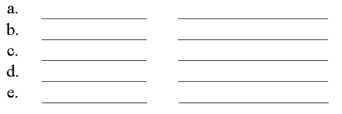For each of the following errors, indicate on the table below the amount by which the trial balance will be out of balance and which trial balance column (debit or credit) will have the larger total as a result of the error.
a. $100 debit to Cash was debited to the Cash account twice.
b. $1,900 credit to Sales was posted as a $190 credit.
c. $5,000 debit to Office Equipment was debited to Office Supplies.
d. $625 debit to Prepaid Insurance was posted as a $62.50 debit.
e. $520 credit to Accounts Payable was not posted.

Definitions:
Near
Located at a short distance in space or time.
Circum-
A prefix indicating 'around' or 'about', used in medical and general terminology.
Peri-
A prefix meaning around, nearby, or encircling, often used in medical terms to describe location or proximity.
Down
a direction towards a lower position or a lower point on a scale.
Q12: Describe the three stages involved in the
Q41: What can management do to create a
Q68: Balance sheet accounts are called _ accounts
Q73: Andrea Conaway opened Wonderland Photography on January
Q88: Adjusting entries are designed primarily to correct
Q99: All of the following regarding a Certified
Q110: Excalibur frequently has accrued expenses at the
Q181: A company made no adjusting entry for
Q195: External users include lenders, shareholders, customers, and
Q207: The primary objective of financial accounting is